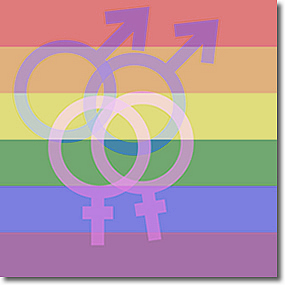 The state-by-state political battle over same-sex marriage is at its climax, with impassioned leadership on both sides. As of this writing such marriages may be performed in 10 countries, and in 6 states within the United States. These numbers appear certain to grow.
The state-by-state political battle over same-sex marriage is at its climax, with impassioned leadership on both sides. As of this writing such marriages may be performed in 10 countries, and in 6 states within the United States. These numbers appear certain to grow.
I have struggled with this issue for a long time, and my own thinking has changed quite a bit even in just the last several years. As a Catholic I assent to many propositions on faith, including the proposition that what we mean by Christian marriage is a sacrament between the sexes. I have also harbored doubts about gay couples being parents. I am inclined to find movies like The Kids Are All Right preachy and off-putting, even disturbing. With all these stipulations, I think nonetheless I have a different take on this now.
I believe we must acknowledge certain facts before we can address this problem plainly. First of all, human sexuality is not a Boolean variable. That is, it is not reducible to an either/or, male/female, X-or-Y-chromosome dichotomy. Human sexuality is a complex, multi-dimensional phenomenon, and people come in a rainbow of sexual types. The bonds that humans form are likewise multi-dimensional, and their depth or validity cannot rationally be measured by their conformance to cultural norms or religious dogmas.
Second, my experience of many gay and lesbian friends over the years, including lifetime-committed couples, confirms that the significant personal bonds they form are no less profound—emotionally and morally—than those of my heterosexual friends, or for that matter of my own. The “mutual support and comfort” a committed couple provide for one another is independent of the types of their genitals.
Third, for historical reasons as much as for cultural ones, our laws and tax codes give a special status to the married relationship. Your spouse cannot legally be required to bear witness against you, is your presumptive heir in the event of your death, and is accorded monetary benefits including social security payments and tax relief in many circumstances. Perhaps most important, your spouse is automatically accorded the rights and recognition of “the responsible person” in the event you find yourself in dire circumstances, such as a health crisis. All of these benefits are part of the social contract of “domestic partnership” and exist independently of your or your spouse’s or anyone else’s moral or religious convictions.
These are simply facts. One may not like them, but that doesn’t alter them. Nor, I think, is it possible to dispute their relevance to the issue under debate. That leaves only the question of what conclusions, if any, can properly be drawn from them.
My own impulse on this as on many similarly thorny issues is to fall back on the principles of secular democracy. I enjoy the freedom to practice my religion, a freedom denied elsewhere to many, and to many of my ancestors in the past, and I enjoy this freedom not because Catholics won the religious wars but because the religious wars ended with the birth of secular democracy. In short, I get to observe the obligation to attend mass on designated holy days, but in return I must make no attempt to impose that obligation on others. When it comes to the laws that govern all of us I must carefully weigh my moral convictions against the right of others to honor their own moral convictions, and as well against the obligation of the state to serve all with equal protection of the laws.
This is never a cut-and-dried matter; it is always difficult, and times change. It was not so long ago that (most) Christians were dead-set against women voting, for instance, a conviction well-founded on the authority both of scripture and of tradition. Certainly the U.S. Constitution was not written with the expectation that women should be “equal” in that sense—far from from it. And yet in time it was found that the principles enshrined in the Constitution could not be honored while denying franchise on the basis of gender.
In view of the three sets of facts I listed above, it is clear that the pro-gay marriage folks have a case to argue. This isn’t a culture war but a genuine conundrum, with issues of basic justice very much at stake.
I don’t have the answer, but I am persuaded that we should separate marriage as a sacrament and/or religious commitment from “marriage” as a legal status. It is clear to me that they are not the same thing. I support my church’s principled opposition to performing the sacrament of marriage between same-sex couples, not with great feeling but nevertheless with consent to its authority in this as in other religious and moral matters. I also support the right of any committed domestic partner to the legal priveleges, protections, and benefits accorded to others.
Some will see a contradiction here, and it is common for people to speak of a “threat” to marriage. But I don’t see a threat, any more than according Jews the right to attend synagogue, Muslims to attend services at their mosque, or atheists to attend to no form of worship constitutes a threat to my practice of Catholicism.
We live in a time when people are socially and culturally more isolated, alienated, and dislocated than ever before in human history. I think we can make room in our laws for those who have found a way to make their lives work, however out of sync it might be with patterns of behavior others take to be normative.

